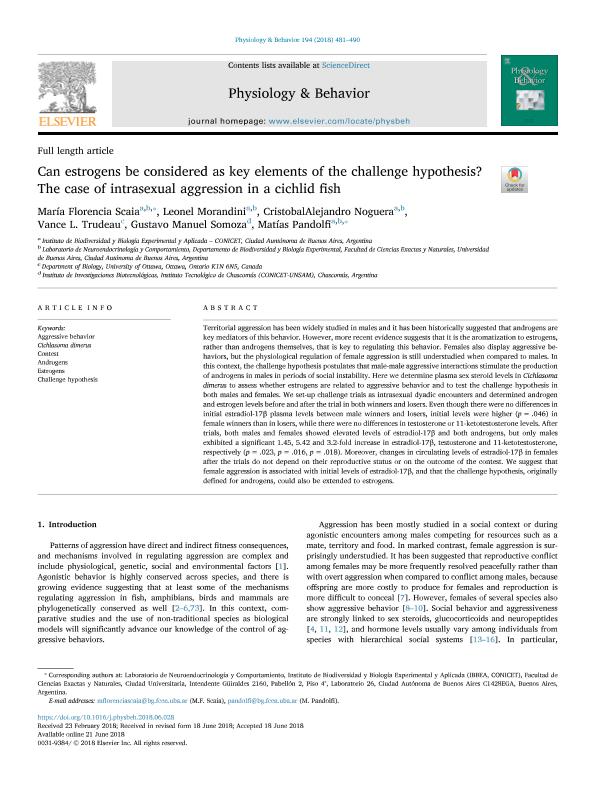Artículo
Can estrogens be considered as key elements of the challenge hypothesis?The case of intrasexual aggression in a cichlid fish
Scaia, María Florencia ; Morandini, Leonel
; Morandini, Leonel ; Noguera, Cristobal Alejandro
; Noguera, Cristobal Alejandro ; Vance Trudeau; Somoza, Gustavo Manuel
; Vance Trudeau; Somoza, Gustavo Manuel ; Pandolfi, Matias
; Pandolfi, Matias
 ; Morandini, Leonel
; Morandini, Leonel ; Noguera, Cristobal Alejandro
; Noguera, Cristobal Alejandro ; Vance Trudeau; Somoza, Gustavo Manuel
; Vance Trudeau; Somoza, Gustavo Manuel ; Pandolfi, Matias
; Pandolfi, Matias
Fecha de publicación:
10/2018
Editorial:
Pergamon-Elsevier Science Ltd
Revista:
Physiology And Behavior
ISSN:
0031-9384
Idioma:
Inglés
Tipo de recurso:
Artículo publicado
Clasificación temática:
Resumen
Territorial aggression has been widely studied in males and it has been historically suggested that androgens are key mediators of this behavior. However, more recent evidence suggests that it is the aromatization to estrogens, rather than androgens themselves, that is key to regulating this behavior. Females also display aggressive behaviors, but the physiological regulation of female aggression is still understudied when compared to males. In this context, the challenge hypothesis postulates that male-male aggressive interactions stimulate the production of androgens in males in periods of social instability. Here we determine plasma sex steroid levels in Cichlasoma dimerus to assess whether estrogens are related to aggressive behavior and to test the challenge hypothesis in both males and females. We set-up challenge trials as intrasexual dyadic encounters and determined androgen and estrogen levels before and after the trial in both winners and losers. Even though there were no differences in initial estradiol-17β plasma levels between male winners and losers, initial levels were higher (p =.046) in female winners than in losers, while there were no differences in testosterone or 11-ketotestosterone levels. After trials, both males and females showed elevated levels of estradiol-17β and both androgens, but only males exhibited a significant 1.45, 5.42 and 3.2-fold increase in estradiol-17β testosterone and 11-ketotestosterone, respectively (p =.023, p =.016, p =.018). Moreover, changes in circulating levels of estradiol-17β in females after the trials do not depend on their reproductive status or on the outcome of the contest. We suggest that female aggression is associated with initial levels of estradiol-17β and that the challenge hypothesis, originally defined for androgens, could also be extended to estrogens.
Archivos asociados
Licencia
Identificadores
Colecciones
Articulos(IBBEA)
Articulos de INSTITUTO DE BIODIVERSIDAD Y BIOLOGIA EXPERIMENTAL Y APLICADA
Articulos de INSTITUTO DE BIODIVERSIDAD Y BIOLOGIA EXPERIMENTAL Y APLICADA
Citación
Scaia, María Florencia; Morandini, Leonel; Noguera, Cristobal Alejandro; Vance Trudeau; Somoza, Gustavo Manuel; et al.; Can estrogens be considered as key elements of the challenge hypothesis?The case of intrasexual aggression in a cichlid fish; Pergamon-Elsevier Science Ltd; Physiology And Behavior; 194; 10-2018; 481-490
Compartir
Altmétricas



